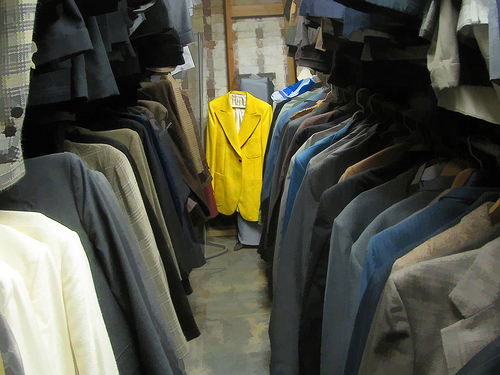 It’s a rising form of discrimination: body size bias.
It’s a rising form of discrimination: body size bias.
More and more, people who are visibly overweight get fewer job offers, are paid less, and asked to pay a larger share of their health insurance premiums.
A recent article on Monster.com tells us that workplace weight discrimination increased 66% from mid-1990s to mid-2000s. Why is it on the rise? Primarily because obesity is considered a treatable behavior-based health condition. In other words, if you’re overweight, it’s your fault. And it’s your fault that you haven’t done anything about it.
Employers can justify not hiring overweight people and paying them less by saying health insurance premiums rise when they employ the overweight who as a group have a higher rate of obesity-related health problems – e.g. diabetes and hypertension. In other words, don’t blame employers for not wanting to hire you – blame yourself (and possibly the health insurance industry).
This form of employment discrimination is legal – or at least not prohibited by law, except in Michigan. So you’re out of luck legally if you think you are a victim of this kind of discrimination.
How can an overweight person deal with this bias during a job search?*
GET YOUR FOOT IN THE DOOR
Usually, the hardest part of a job search is getting an interview. So you want to get in the door by having the best written materials possible. No one can tell you’re overweight from a resume and cover letter.
Build a resume that markets you to do what you do best. On paper, you need to shine. Your resume must show your impact, results, accomplishments, talents, skills, and a personality. You want to stand out as a “must interview” person long before they get to see you in person.
Target the jobs you apply for. You only need one strong resume when you apply for jobs that will use your skills and experience, and need someone to produce the kind of impact you have produced in the past. You can pepper your resume with keywords applicable to the jobs. This optimizes your resume for Applicant Tracking Systems (ATS) and you stand a better chance of being called for an interview.
Write “marketing” cover letters. Match your experience to the job. Be specific. State the obvious. Tell them why you’ll do the same for them as you did for other employers. Tell them you want to work there because the company and job are so perfect.
Optimize your LinkedIn profile. Ideally, your resume and LinkedIn profile are substantially the same. You can add some things to your LinkedIn profile that make it more likely you will be found by recruiters who need someone with your skill set especially the section on Skills. You also need to put key words in the title you give yourself. For example, instead of saying “Vice President of Marketing, BigBucks Bank,” you would say “Senior-level Marketer | Communications | Brand | Social Media | Integrated Campaigns | Financial Services.”
- Choose a flattering profile picture. I suggest a 3/4 profile head shot of you smiling (you must smile on LinkedIn or it puts people off). It is naturally more slimming than a face-forward photo. I’ve seen some great shots recently of people with their heads bowed slightly, so you can see most of their face and their smile (but not their double or triple chin).
- Hire a real photographer to take your profile picture. I know, it costs money. And when you’re unemployed, you count pennies. Yet, pros know how to position you in the most flattering way. Think of it as an investment in your future job, one that will pay you far more than the photograph cost. Maybe a friend or a few friends will make you a gift of a professional photograph. Maybe you can borrow the money from someone. Maybe there are photography classes that need subjects. Get creative to get a great photo for LinkedIn, one that flatters you instead of fattens you.
MAKE A FANTASTIC VERBAL IMPRESSION
First steps in most hiring processes are usually a telephone screening interview. This again is non-visual, so it’s a great opportunity for you to impress the employer.
Be prepared for the interview so you sound as confident as you will feel. I have a post on Phone Interviews that I urge you to read. I’ll add to it that you need to give yourself plenty of time before the interview (10 or 15 minutes at least), so you are there when the interviewer calls, and have your materials and notes at the ready.
DRESS THE PART
You passed the initial screening and now you’re going for an in-person interview (or a video interview). The most important thing is to get professional, flattering clothes that fit. If your clothes don’t fit well, you will be uncomfortable. And make sure you have great, stylish shoes. Women need to wear appropriate makeup and jewelry.
When someone wears clothes that fit and flatter them, that conveys confidence. And confidence is what an employer wants more than anything else. Confidence that you can do the job, do it well, and produce great results. The subliminal message you will send with well-tailored clothes, shoes and accessories is that you are not hiding yourself. You know your self-worth. It’s hard for someone to disparage someone who is confident.
Our goal is for our clothes to enhance the overall impression that we are capable of doing the work and having the desired impact. We don’t want clothes to distract anyone from that goal.
Wearing clothes that are intended to hide your weight is a bad idea. First, my experience is that people can see our weight. We can’t camouflage it. Second, most of those clothes are ugly or boring or drab, anyway. Baggy just looks sloppy and that’s not the image you want to convey. Third, any attempts to hide my body are subliminally read as insecurity, and that is anathema to employers. My opinion is that insecure people bring out the latent bully in some people, the latent rescuer in others, and disdain in still others. This is where “blaming the overweight” begins.
TAKE THE ACTION & LET GO OF THE RESULTS
Once you are in the interview, other people’s views, prejudices and opinions come into play. We can’t control other people. We can control ourselves. This includes accepting the reality of the difficulties that our weight poses and not resenting the slim for their bodies and power. Such resentment is sniffed out by employers and IMHO is the surest way to get shown the door.
GO THE DISTANCE
Write the thank you letter as soon as possible. Include some information from the interview, and re-emphasize a) your strong interest in the job (employers like to hire people who want them) and b) how you fit the job. If there are any outstanding issues that came up in the interview, address them briefly (I have a post on that, too).
Good luck!
* disclosure: I’ve had my own issues with weight, so I speak from experience and with compassion, not blame.


